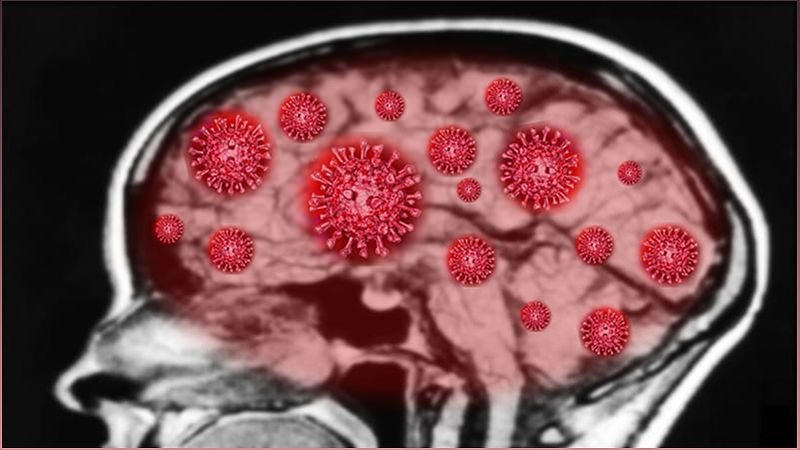A recent study reveals that long COVID brain fog, characterized by cognitive difficulties, memory loss, and poor concentration, is linked to a viral-borne brain injury. The study provides objective evidence of long-term brain damage in patients recovering from severe COVID-19, shedding light on the impact of the virus on the brain and validating the experiences of those with these often-dismissed symptoms.
Understanding Long COVID Brain Fog and its Link to Viral-Borne Brain Injury
Long COVID brain fog, characterized by cognitive difficulties, memory loss, and poor concentration, has been identified as a result of a viral-borne brain injury, according to a recent study. This finding provides validation for the experiences of individuals recovering from severe COVID-19 who have often faced skepticism regarding their ongoing symptoms.
The study, involving 351 patients hospitalized with severe COVID-19, revealed evidence of long-term brain damage one year after contracting the SARS-CoV-2 virus. Cognitive tests, brain scans, and biomarker analysis were conducted, showing reduced volume in attention-related brain regions and cognitive deficits equivalent to 20 years of brain aging.
These objective findings confirm the physical nature of long COVID brain fog, dispelling the notion that it is imagined or unrelated to the virus. Lead neuropsychologist Karla L. Thompson emphasizes the importance of recognizing the validity of these symptoms and providing appropriate treatment to patients who have been overlooked.
Uncovering the Long-Term Brain Injuries in Severe COVID-19 Patients
The study's findings offer valuable insights into the long-term brain injuries associated with severe COVID-19. Patients recovering from severe cases of the virus often experience brain fog and cognitive impairments, which can significantly impact their quality of life.
Brain scans of the 351 patients revealed atrophy in the gray matter, likely resulting from inflammation caused by an overactive immune response rather than direct viral damage. These structural changes in the brain, particularly in regions associated with attention, contribute to the cognitive difficulties observed in patients.
Furthermore, the cognitive deficits observed in these patients were found to be equivalent to 20 years of brain aging, highlighting the significant impact of the virus on cognitive function. This evidence underscores the need for further research and appropriate interventions to prevent and mitigate long-term brain damage.
Exploring Potential Causes and Treatment Options for COVID-Related Brain Injuries
The exact causes of brain injuries in COVID-19 patients are still uncertain, but researchers have identified some potential factors. Lack of oxygen to the brain, particularly in patients on ventilators, may contribute to these injuries. Inflammation resulting from an overactive immune response rather than direct viral damage is also believed to play a role.
While the study found that the use of steroids during hospitalization to reduce brain inflammation had some neuroprotective effects, further research is needed to determine the effectiveness of anti-inflammatory or antiviral medications in preventing and mitigating brain injuries associated with COVID-19.
Treating long COVID brain fog as a brain injury can help patients regain some normalcy in their lives. Speech, cognitive, and occupational therapy, along with addressing mental health concerns, have shown promise in managing these symptoms. However, there is concern that the virus-induced aging of the brain may have long-term consequences, potentially leading to the early onset of dementia and Alzheimer's disease in vulnerable individuals.
Remaining Questions and the Path Forward
While the study provides valuable insights into the brain damage caused by severe COVID-19, there are still many unanswered questions. The impact on individuals with milder cases of the virus remains unclear, and more research is needed in this area.
Additionally, researchers and clinicians need a better understanding of the mechanisms by which the virus enters the brain and causes structural damage. Determining the effectiveness of different medications and interventions, such as anti-inflammatory drugs or steroids, is crucial in preventing and mitigating brain injuries associated with COVID-19.
As the virus continues to affect the population, finding answers to these questions and developing appropriate interventions becomes increasingly important. Further research and collaboration among scientists, healthcare professionals, and policymakers are essential to addressing the long-term impact of COVID-19 on the brain.
Conclusion: Validating Long COVID Brain Fog and the Need for Further Research
The study's findings establish a link between long COVID brain fog and viral-borne brain injuries, providing objective evidence for the experiences of individuals recovering from severe COVID-19. Recognizing the physical nature of these symptoms and providing appropriate treatment is crucial in helping patients regain their quality of life.
Further research is needed to fully understand the impact of COVID-19 on the brain and develop effective interventions to prevent long-term brain damage. By addressing the remaining questions and advancing our knowledge, we can better support individuals affected by long COVID brain fog and minimize the long-term consequences of the virus on cognitive function.

